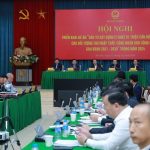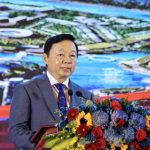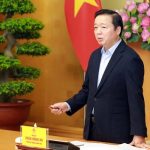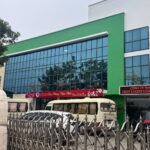On the morning of August 13, Deputy Prime Minister Tran Hong Ha chaired a meeting to review and provide feedback on the draft Decree on self-produced and self-consumed rooftop solar power.
The Deputy Prime Minister emphasized the need for consistency and scientific approach in terms of technicalities and economic efficiency when formulating the Decree, which should be placed within the context of the overall planning and implementation of the Power Development Plan VIII. He stressed the importance of not delaying energy security and meeting the demands of socio-economic development.
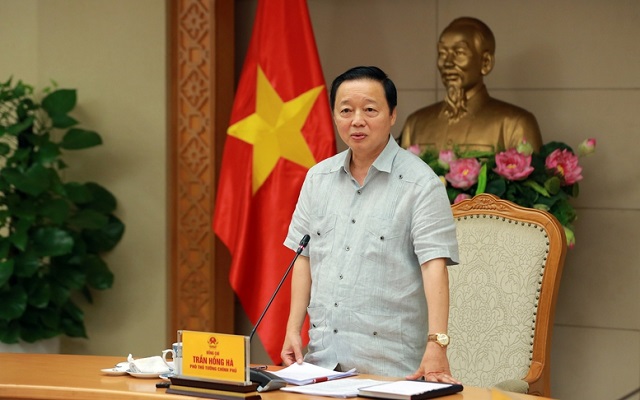 Deputy Prime Minister Tran Hong Ha proposed that the Ministry of Industry and Trade study and agree on a 20% ratio for selling excess electricity from self-produced and self-consumed rooftop solar power sources into the national power system – Photo: VGP/Minh Khoi
|
Simplified and convenient policies without creating new procedures
After taking into account the opinions of ministries, sectors, businesses, and experts, the Ministry of Industry and Trade has adjusted and supplemented the incentive policies. Accordingly, organizations and individuals installing self-produced and self-consumed rooftop solar power systems that are not connected to the national power system will be given priority for unlimited capacity development and will be exempt from power activity licenses.
Organizations and individuals installing self-produced and self-consumed rooftop solar power systems that are connected to the national power system will also be exempt from power activity licenses.
In the case of self-produced and self-consumed rooftop solar power sources with an installed capacity of more than 1 MW and choosing to sell excess electricity into the national power system, organizations and individuals must obtain a power activity license in accordance with the law.
The Ministry of Industry and Trade has taken on board the suggestions of ministries, sectors, and the People’s Committee of Hanoi regarding the simplification of procedures related to registration, investment, construction, and acceptance of rooftop solar power systems.
Households and detached houses will provide design drawings for installation, as well as a copy of the construction permit for existing works (if any) as stipulated by law.
Other entities, such as factories, industrial parks, and offices, will provide installation design drawings, investment registration certificates, construction permits, fire prevention and control acceptance, and results of the acceptance of existing construction works…
The People’s Committees of the provinces are responsible for developing and issuing streamlined procedures to ensure convenience and facilitate organizations and individuals in implementing registration, investment, construction, and installation of self-produced and self-consumed rooftop solar power systems. They will also delegate state management responsibilities to subordinate agencies to guide organizations and individuals in implementing investment, construction, installation, acceptance, and operation in accordance with the law on investment, construction, fire prevention and control, environment, and electricity.
The Deputy Prime Minister requested the Ministry of Industry and Trade to consider simplifying the issuance of certificates for registration of self-produced and self-consumed rooftop solar power development at residential and office buildings, without creating new administrative procedures.
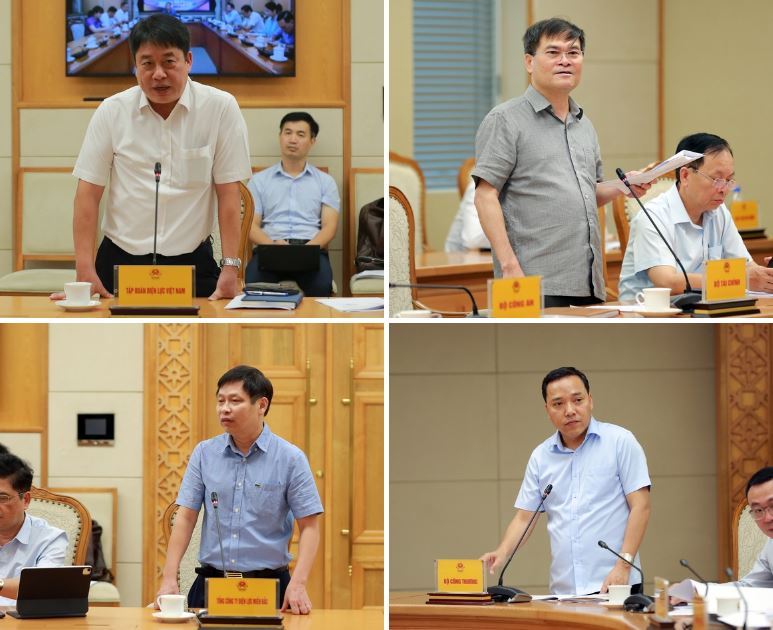
Some opinions suggested the need for policies to encourage the development of self-produced and self-consumed rooftop solar power in the North, which has a high rate of load increase – Photo: VGP/Minh Khoi
|
Selling a maximum of 20% of installed capacity
Regarding the option to sell excess electricity to the national power system, the Ministry of Industry and Trade proposed a ratio of 20% of the actual installed capacity in the North and 10% in other regions.
The Vietnam Electricity Group will make payments to organizations and individuals for the amount of excess electricity fed into the national power system at a price that is smaller than or equal to the average electricity market price in the previous year, as announced by the unit operating the electricity system and the electricity market. This aims to ensure appropriate encouragement during each development period of the national power system.
Mr. Nguyen Anh Tuan, General Director of the Vietnam Electricity Group (EVN), stated that the entire Northern region currently has about 700 MW of rooftop solar power, while the system’s capacity can accommodate about 7,000 MW.
Mr. Do Van Nam, Member of the Members’ Council of the Northern Power Corporation, calculated that with the regulations in the draft Decree, people would save on electricity costs during peak hours. Along with the price of selling excess electricity into the system, households could recoup their investment in about 5-6 years, while the lifespan of a solar panel is currently about 12-15 years.
The Deputy Prime Minister emphasized the need to “open up room” for self-produced and self-consumed rooftop solar power, especially in the North, by having policies in place to encourage efficient investment and development. He requested the Ministry of Industry and Trade to review the load demand, transmission capacity, and system safety as a basis for adjusting the planning and implementation plan.
The Deputy Prime Minister also proposed that the Ministry of Industry and Trade study and agree on a 20% ratio for selling excess electricity from self-produced and self-consumed rooftop solar power sources into the national power system.
The draft Decree also supplements regulations on the acceptance of measurement systems and the collection of measurement data from a distance, as well as on-site monitoring and control systems, and their connection to the information collection, monitoring, and control system of the distribution dispatch level for self-produced and self-consumed rooftop solar power systems that are connected to the national power system. Accordingly, installed capacity below 100 kWh will be connected to the unit’s power system. Installed capacity above 100 kWh, whether selling or not selling excess electricity into the national power system, must be connected to the distribution dispatch level.
The Deputy Prime Minister noted the importance of having technical management solutions to control the capacity of self-produced and self-consumed rooftop solar power sources to ensure system safety, especially for those sources connected to the medium-voltage grid.
Creating more space for self-produced and self-consumed rooftop solar power
During the meeting, the delegates discussed incentive policies for cases where self-produced and self-consumed rooftop solar power systems with energy storage systems are installed, as well as the mechanism for developing rooftop solar power in industrial parks and clusters to avoid overlapping with Decree No. 80/2024/ND-CP, which stipulates the mechanism for direct power purchase between renewable energy generators and large power consumers.
Notably, some opinions suggested reconsidering the regulation that the total installed capacity of self-produced and self-consumed rooftop solar power systems connected to the national power system should not exceed the approved capacity in the plan for implementing the National Power Development Plan.
The Deputy Prime Minister assigned the Ministry of Industry and Trade, EVN, and relevant units to calculate the load demand, ensure system safety, and assess the transmission network capacity in localities and regions when mobilizing self-produced and self-consumed rooftop solar power sources connected to the national power system. This information will be presented to the Prime Minister for adjustment of the National Power Development Planning.
Regarding transitional regulations for organizations and individuals who have invested in self-produced and self-consumed rooftop solar power systems during the period of the National Power Development Planning after December 31, 2020, the draft Decree stipulates that those who have installed self-produced and self-consumed rooftop solar power systems not connected to the national power system should send relevant information to the authorized agency for certification of development scale and location.
Households and detached houses that have installed self-produced and self-consumed rooftop solar power systems connected to the national power system should send relevant information to the authorized agency for certification of development scale and location. In case of registering to supplement the sale of excess electricity into the national power system, the regulations of this Decree shall apply.
Nhat Quang
Deputy Prime Minister Tran Hong Ha inspects and accelerates the progress of two key infrastructure projects, strategic in nature.
On the morning of February 17th, Deputy Prime Minister Tran Hong Ha and his delegation conducted an inspection of the construction progress of the Diễn Châu-Bãi Vọt expressway section, part of the Bac-Nam Eastward highway project phase 2017-2020, and the 500 kV Quảng Trạch-Quỳnh Lưu power line, part of the 500 kV circuit 3 Quảng Trạch-Phố Nối power line project.
Developing Social Welfare: Allowing businesses to use land-based assets as collateral for credit borrowing.
Deputy Prime Minister Tran Hong Ha has instructed the Ministry of Construction, the State Bank, the Ministry of Finance, and the Ministry of Natural Resources and Environment to study solutions and measures to facilitate and support banks in implementing the 120 trillion VND preferential credit package for social housing in accordance with market mechanisms. This includes allowing businesses to pledge assets formed on land as collateral for credit loans and establishing a social housing fund.
Deputy Prime Minister: ‘I believe Cam Lam will create new miracles’
According to Deputy Prime Minister Tran Hong Ha, Cam Lam – Khanh Hoa will create new miracles, new values, outstanding, vibrant, creative, aspiring, ambitious, prosperous, and prosperous.
Deputy Prime Minister: Urgent need to address market ‘pushing prices’ and ‘inflating prices’ in real estate
On the morning of March 11, Deputy Prime Minister Tran Hong Ha presided over a direct and online meeting of the Working Group of the Prime Minister on reviewing, urging, and guiding the resolution of difficulties and obstacles in the implementation of real estate projects for localities and businesses (Working Group) after the Land Law (amended), the Real Estate Business Law (amended), the Credit Institutions Law (amended), and the Housing Law (amended) were enacted.



